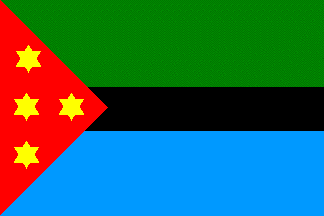
image by Jairo Alonso Méndez Méndez and Ivan Sache, 26 July 2009

Last modified: 2009-10-02 by dov gutterman
Keywords: santander | albania |
Links: FOTW homepage |
search |
disclaimer and copyright |
write us |
mirrors

image by Jairo Alonso Méndez Méndez and Ivan
Sache, 26 July 2009
See also:
According to the municipal
website, the flag has
four yellow stars (1:2:1) on the triangle.
Felipe Carrillo, 2 January 2009
Translated from the municipal
website:
"The flag of Albania with its red triangle represents the
progressist and working blood of the inhabitants of the
municipality, the stars represent the police inspections [I
guess, police administrative divisions], that is, La Mesa,
Guacos, El Hatillo and Carretero; today [the municipality] has
only two villages, El Hatillo and La Mesa, and the urban center;
in the upper part, the green colour represent the vegetation of
the territory, the black stripe represents the mining resources,
especially coal, and the blue stripe, in the lower part,
represents the abundant hydric resources watering our soil. The
flag was designed by Ana Elizabeth Carrillo Verano."
On the coat of arms, the four municipal flags used as supporters
are starless, the four stars (here white with black border) being
placed in a rectangular cartouche over the shield.
A photo at themunicipal
website, taken during of the Festival of the Virgin del
Carmen shows the flag with a circular emblem placed over the
confluency of the three fields. The emblem is made of the
municipal coat of arms placed on a white disk surrounded by a
brown ring charged with "ALCALDIA / DE ALBANIA" in
white letters.
This flag matches the flag of Colombia hoisted on the other part
of the stand, in which the coat of arms is also inscribed in a
brown ring charged with "REPUBLICA DE COLOMBIA" in
white letters.
The municipality of Albania was created by Departmental Decree
No. 46 on 12 July 1904, with Pueblo Viejo as its capital; this
Decree abrogated Decree No. 70 of 1903 creating the municipality
of Pariquí. The 1904 Decree had no effect until 31 March 1913,
when the Departmental Assembly ordered the Governor to organize
the municipality, appoint a Mayor and call for municipal
elections; the Governor was able to postpone the order until
1919, when the capital of the municipality was set up in the site
of Chevre, already settled for a few years around a school and a
chapel. On 26 April 1919, by Decree No. 33, the Departmental
Assembly abrogated the 1901 Decree and set up the capital of the
municipality in La Mesa del Carmen; the municipality was
eventually inaugurated on 20 August 1919. The villagers of Pueblo
Viejo challenged the Decree, which was cancelled; the capital of
the municipality was legally set up in La Mesa del Carmen by (yet
another) Decree No. 51 on 21 April 1921.
Ivan Sache, 26 July 2009
sanal.jpg)
image contributed by Jairo Alonso Méndez Méndez, 30
November 2004